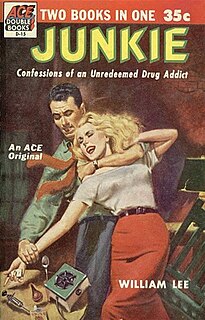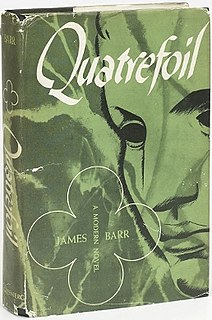 W
WAdvise and Consent is a 1959 political fiction novel by Allen Drury that explores the United States Senate confirmation of controversial Secretary of State nominee Robert Leffingwell, whose promotion is endangered due to growing evidence—explored in the novel—that the nominee was a member of the Communist Party. The chief characters' responses to the evidence, and their efforts to spread or suppress it, form the basis of the novel.
 W
WThe Charioteer is a war novel by Mary Renault first published in London in 1953. Renault's US publisher (Morrow) refused to publish it until 1959 due to its generally positive portrayal of homosexuality. The Charioteer is significant because it features a prominent - and positive - gay theme at an early date and quickly became a bestseller - particularly within the gay community.
 W
WChocolates for Breakfast is a 1956 American novel written by Pamela Moore. Originally published in 1956 when Moore was eighteen years old, the novel gained notoriety from readers and critics for its frank depiction of teenage sexuality, and its discussion of the taboo topics of homosexuality and gender roles. The plot focuses on fifteen-year-old Courtney Farrell and her destructive upbringing between her father, a wealthy Manhattan publisher, and her mother, a faltering Hollywood actress.
 W
WForbidden Colors is a 1951 novel by the Japanese writer Yukio Mishima, translated into English in 1968. The name kinjiki is a euphemism for homosexuality. The kanji 禁 means "forbidden" and 色 in this case means "erotic love", although it can also mean "color". The word "kinjiki" also means colors that were forbidden to be worn by people of various ranks in the Japanese court. It describes a marriage of a gay man to a young woman. Like Mishima's earlier novel Confessions of a Mask, it is generally considered somewhat autobiographical.
 W
WGiovanni's Room is a 1956 novel by James Baldwin. The book focuses on the events in the life of an American man living in Paris and his feelings and frustrations with his relationships with other men in his life, particularly an Italian bartender named Giovanni whom he meets at a Parisian gay bar.
 W
WHemlock and After is a 1952 novel by British writer Angus Wilson; it was his first published novel after a series of short stories. The novel offers a candid portrayal of gay life in post-World War II England.
 W
WI Am a Woman is a lesbian pulp fiction novel written in 1959 by Ann Bannon. It is the second in a series of pulp fiction novels that eventually came to be known as The Beebo Brinker Chronicles. It was originally published in 1959 by Gold Medal Books, again in 1983 by Naiad Press, and again in 2002 by Cleis Press.
 W
WJunkie: Confessions of an Unredeemed Drug Addict is a novel by American beat generation writer William S. Burroughs, published initially under the pseudonym William Lee in 1953. His first published work, it is semi-autobiographical and focuses on Burroughs' life as a drug user and dealer. It has come to be considered a seminal text on the lifestyle of heroin addicts in the early 1950s.
 W
WThe King Must Die is a 1958 bildungsroman and historical novel by Mary Renault that traces the early life and adventures of Theseus, a hero in Greek mythology. Naturally, it is set in Ancient Greece: Troizen, Corinth, Eleusis, Athens, Knossos in Crete, and Naxos. Rather than retelling the myth, Renault constructs an archaeologically and anthropologically plausible story that might have developed into the myth. She captures the essentials while removing the more fantastical elements, such as monsters and the appearances of gods. The King Must Die was lauded by critics, with New York Times reviewer Orville Prescott calling it "one of the truly fine historical novels of modern times." Renault wrote a sequel, The Bull from the Sea, in 1962.
 W
WThe Last of the Wine is Mary Renault's first novel set in ancient Greece, the setting that would become her most important arena. The novel was published in 1956 and is the second of her works to feature male homosexuality as a major theme. It was a bestseller within the gay community. The book is a portrait of Athens at the close of the Golden Age and the end of the Peloponnesian War with Sparta, and includes Socrates as a character.
 W
WMemoirs of Hadrian is a novel by the Belgian-born French writer Marguerite Yourcenar about the life and death of Roman Emperor Hadrian. First published in France in French in 1951 as Mémoires d'Hadrien, the book was an immediate success, meeting with enormous critical acclaim. Although the historical Hadrian wrote an autobiography, it has been lost.
 W
WOdd Girl Out is a lesbian pulp fiction novel written in 1957 by Ann Bannon. It is the first in a series of pulp fiction novels that eventually came to be known as The Beebo Brinker Chronicles. It was originally published in 1957 by Gold Medal Books, again in 1983 by Naiad Press, and again in 2001 by Cleis Press. Each edition was adorned with a different cover. Not until 1983 did author Ann Bannon learn that her first novel was the second best-selling paperback of 1957.
The Price of Salt is a 1952 romance novel by Patricia Highsmith, first published under the pseudonym "Claire Morgan". Highsmith—known as a suspense writer based on her psychological thriller Strangers on a Train—used an alias because she did not want to be tagged as "a lesbian-book writer", and because of the use of her own life references for characters and occurrences in the story. Though Highsmith had many sexual and romantic relationships with women and wrote over 22 novels and numerous short stories, The Price of Salt is her only novel about an unequivocal lesbian relationship and its relatively happy ending was unprecedented in lesbian literature. It is also notable for being the only one of her novels with "a conventional 'happy ending'" and characters who had "more explicit sexual existences".
 W
WQuatrefoil: A Modern Novel, sometimes called Quatrefoil, is a novel about gay men written in 1950 by James W. Fugaté under the pen name James Barr. It is known for being the first modern book to portray homosexuality in a positive way. The main character, Phillip, is based on a college fraternity brother that the author had an affair with while in college.
 W
WQueer is an early short novel by William S. Burroughs. It is partially a sequel to his earlier novel, Junkie, which ends with the stated ambition of finding a drug called Yage. Queer, although not devoted to that quest, does include a trip to South America looking for the substance.
 W
WA Room in Chelsea Square is a 1958 British gay novel by Michael Nelson, originally published anonymously due to its homosexual content and "thinly veiled portrayals of prominent London literary figures." It is about a wealthy gentleman who lures an attractive younger man to London with the promise of an upper crust lifestyle.
 W
WSpring Fire, is a 1952 paperback novel written by Marijane Meaker, under the pseudonym "Vin Packer". It is the first lesbian paperback novel, and the beginning of the lesbian pulp fiction genre; it also addresses issues of conformity in 1950s American society. The novel tells the story of Susan "Mitch" Mitchell, an awkward, lonely freshman at a Midwestern college who falls in love with Leda, her popular but troubled sorority sister. Published by Gold Medal Books, Spring Fire sold 1.5 million copies through at least three printings.
 W
WThe Girls in 3-B is a classic work of lesbian pulp fiction by Valerie Taylor which was published in 1959 by Fawcett. Its happy ending for a lesbian character was unusual for the time period. It was one of the first three novels of any pulp fiction genre to be reprinted in 2003 by Feminist Press.
 W
WThin Ice is a 1956 novel by the British writer Compton Mackenzie. It tells the career of a homosexual politician seen through the eyes of his lifelong, heterosexual friend.
 W
WWomen in the Shadows is a lesbian pulp fiction novel written in 1959 by Ann Bannon. It is the third in a series of pulp fiction novels that eventually came to be known as The Beebo Brinker Chronicles. It was originally published in 1959 by Gold Medal Books, again in 1983 by Naiad Press, and again in 2002 by Cleis Press. Each edition was adorned with a different cover.
 W
WWomen's Barracks: The Frank Autobiography of a French Girl Soldier is a classic work of lesbian pulp fiction by French writer Tereska Torrès published in 1950. Historians credit it as the first US paperback-original bestseller, as the first lesbian pulp fiction book published in America, and as "the pioneer of lesbian fiction". As the first of its genre, it received heavy backlash, and it was banned in Canada. Its popularity prompted the formation of the House Select Committee on Current Pornographic Materials in the United States. Its original cover art is considered a classic image of lesbian fiction.